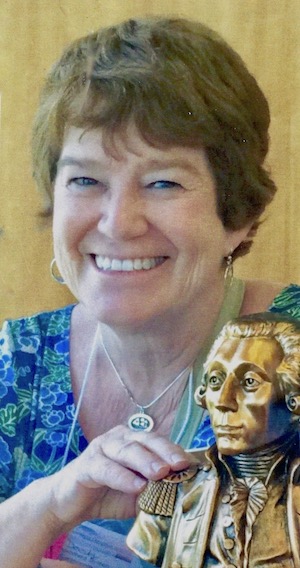In A Buss from Lafayette, I had lost track of the source of two small incidents I used to illustrate Lafayette's marvelous sense of humor. Along with his enduring commitment to the cause of Liberty, his personal bravery in battle, his financial support of the war, his go-between efforts to make the French Alliance work and secure even more aid, I have always believed Lafayette's humor was a major contribution to our struggle for independence. His humor and charm were wonderful antidotes when things looked very bleak for our cause. In some ways, I think he was the Morale-Booster-in-Chief!
Here is a case in point: imagine how Washington felt after the Battle of Brandywine, on September 11, 1777. He was desperately trying to prevent the British from capturing Philadelphia, a sort of Capital Pro Tempore for the 13 colonies because the Continental Congress met there. Not only had he been hoodwinked by Tory locals about the existence of upstream fords on Brandywine Creek where the British crossed to outflank his troops, but his men lacked the training to deal with such a maneuver.
Here's what Washington wrote about the battle to Congress:
At Midnight, Chester [Pennsylvania], September 11, 1777.
Sir: I am sorry to inform you, that in this day's engagement, we have been obliged to leave the enemy masters of the field. Unfortunately the intelligence received of the enemy's advancing up the Brandywine, and crossing at a ford about six miles above us, was uncertain and contradictory, notwithstanding all my pains to get the best. This prevented my making a disposition, adequate to the force with which the Enemy attacked us on the right; in consequence of which the troops first engaged, were obliged to retire before they could be reinforced. . .Notwithstanding the misfortune of the day, I am happy to find the troops in good spirits; and I hope another time we shall compensate for the losses now sustained.. ."
One of those whose good spirits Washington found cheering was Lafayette, who had been wounded in the leg in the battle.
Here is what I wrote about that:
Another in the crowd of attentive listeners told how Lafayette had been laid upon a dining-room table to have his wounded leg bandaged. When Washington and his aides had arrived, the young Frenchman had joked that they looked awfully hungry and he hoped no one would mistake him for dinner. - A Buss from Lafayette, © 2016 by Dorothea Jensen
After A Buss from Lafayette was published, I started writing posts on Bublish.com about where my story ideas came from and I could not remember where I had found this one. Then out of the blue, Alan Hoffman, President of the American Friends of Lafayette, talked about this incident in a speech he made to the group. I immediately assailed him to find out his source. He said that it came from a rare interview Lafayette did with Poulson’s American Daily Advertiser when he was on his Farewell Tour, and directed me here: http://www.ushistory.org/march/other/lafwound.htm
Here is the article.
"Lafayette returned to America in 1824 for a triumphal tour. The French hero was greeted enthusiastically in many cities. And perhaps no city loved him more than Philadelphia, the place where the 19-year Frenchman initially met General Washington in 1777 shortly before the Battle of Brandywine.
On February 25, 1825, Lafayette granted "Poulson's Advertiser," one of Philadelphia's leading newspapers, an interview. In the piece, Lafayette recalled receiving his wound at Brandywine:
The ball went through and through; I was on foot when I received my wound; a part of our line had given way but a part still held its ground. To these I repaired. To encourage my comrades, and to show them I had no better chance of flight than they, I ordered my horse to the rear. The news of my being hurt was conveyed to the commander-in-chief, with the usual exaggerations in such cases. The good General Washington freely expressed his grief that one so young, and a volunteer in the holy cause of freedom, should so early have fallen; but he was soon relieved by an assurance that my wound would stop short of life, when he sent me his love an gratulation that matters were no worse. On the field of battle the surgeon prepared his dressings, but the shot fell so thick around us, that in a very little time, if we had remained, we should both have been past all surgery. Being mounted on my horse I left the field, and repaired to the bridge near Chester, where I halted and placed a guard, to stop fugitive soldiers, and direct them to join their respective regiments. I could do no more; becoming faint, I was carried into a house in Chester and laid on a table, when my wound received its first dressing. The general officers soon arrived, when I saluted them by begging that they would not eat me up, as they appeared to be very hungry, and I was the only dish upon the table in the house. The good general-in-chief was much gratified on finding me in such spirits, and caused a litter to be made, on which I was conveyed to the Indian Queen [a tavern/hotel] in Philadelphia, and was there waited upon by the members of Congress, who were all booted and spurred and on the wing for a place of greater safety to hold their sessions. The enemy continuing to advance, I was removed to Bristol, and thence in the coach of President Laurens (and coaches were rare in those days) to Reading [here Lafayette's memory fails him — he was actually moved to Bethlehem], where I remained until so much recovered as to be able to repair to head-quarters."
***
Whew! Now I can sleep nights. (I'll write about the other incident later. This post is getting too long!)


No comments:
Post a Comment